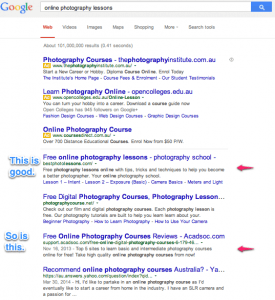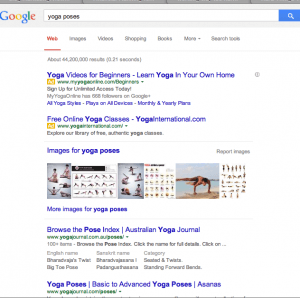How Does Google Search Work? My Secret Traffic Hack Revealed
So you want to rank on Google?
Well before Google you can rank you, it has to find you first. Or I should say, it has to find your content first.
So how does Google search work?
Search engines not only rank your pages, they also crawl and index your pages. Only after these two things are done can your pages and posts start to rank.
Many people believe that SEO is only about achieving a high ranking in the search engines and that’s all they aim for. While I agree that it’s important, it’s not the be or end all when it comes to getting more traffic to your website.
If you’re priority is to only get the #1 position on Google without regard to producing quality content, then you’re leaving a lot of potential on the table.
What is forgotten is creating the BEST search engine ad you possibly can for your blog post or web page. This means instead of worrying about only getting a high position on Google, focus on the REAL measurement of SEO – your click-through rate. In other words, your conversion rate.
Why?
Because you can still get a lot of search traffic even if you’re ranking at #9, #15 or #12. And in some cases, you can actually take traffic away from those big boys + gals that are ranking above you in the search results.
This is particularly useful if you’re just starting out or your blog doesn’t have a lot of domain or page authority yet.
Focus on getting the CLICK
Congratulations.
If you decide today after reading this that you’re going to work on increasing your click-through rate, then you’re going to be in that 1 percent crowd. Because everyone else is doing the same thing and worrying only about getting as high ranking as possible in the search results.
Think about it. You could get a #3 or even a #1 ranking on Google for a particular search phrase. While that would be great, it would only ever be good for your ego to say you claimed a high ranking on Google if NOBODY bothered to click on it.
How can you get more customers and grow your business if nobody is going to click on your search listing?
What’s the point of ranking #1 if no-one wants to click on your search result? That great blog post you just spent 5 hours or more creating has gone to waste because nobody wants to read it.
And because nobody wants to read it, Google interprets this as a negative signal about your site. Then that #1 ranking you claimed (ever so briefly) is taken right from under your nose and someone else has claimed it (probably by someone with a better search engine ad).
Aim to rank high in search engines but also focus on your search engine listing.
To achieve a high ranking in Google, you need to be sure you’re selecting the right keywords in the first place. When you focus on your search engine ad, you need to hone your copywriting skills.
My secret traffic hack revealed
This is what you need to focus on.

What you’re looking at here is a typical search results page for “online photography courses.” When someone types a question or phrase into Google, the search engine returns a list of top 10 search results for each page.
The user is then faced with a barrage of choices he or she must make – which search engine ad should they click on?
What compels you to click on a particular search ad when you’re Googling something?
That depends on a few things, which I’ll explain now.
The anatomy of a search result
While the rest of the online world is worrying about trying to achieve a #1 ranking, you’re a lot smarter and you’re going to improve your conversion rate.
You’d rather get more clients and leads than just a #1 ranking for the sake of it right? YES!
The Page Title:
Google uses your Page Title to generate the title of your listing in the search results. It’s the first thing people see on the search results page.
You have to grab their attention and persuade them to click YOUR listing.
If you use WordPress you can edit the page title using your SEO plugin. So how do you create an effective page title that is worthy of a click?
You want to optimize it for the keyword or phrase that you’re targeting but that alone is a little dry and boring. You need to go beyond that. Instead you want to target your keyword AND create something that entices your ideal client to click on it – something that speaks directly to them.
Let’s say someone is searching for “yoga poses.”

YOGA.com has a pretty boring page title. It doesn’t compel me to want to click on it. YogaGlo.com is worse – their page title is only optimized for one word. In both of these examples, their page titles are only optimized for their keyword and nothing more.
However Yoga Journal, Fitness Magazine and Buzzfeed have page titles that are a little more compelling. They provide more information to the reader so the reader has a clear idea of what to expect if they were to click on it. By being more specific, e.g. stating “yoga poses for beginners” in the page title, it’s likely to attract people that are actually searching for “yoga poses for beginners.”
The Meta Description:
This is the copy that appears under the page title that gives search engines a summary of what the page is about.
This is crucial and has everything to do with whether people click.

Most descriptions are on the boring side and many people leave a lot of potential on the table here. But you have such an enormous opportunity to create an enticing piece of copy that will have your search engine listing begging to be clicked.
Don’t leave it blank. Use your SEO plugin to fill in a description. If you don’t create a description, the search engines will decide for you what to display but you don’t want to do that. They might crawl something that is very unexciting and doesn’t make any sense.
The best meta descriptions are those that are original and include a value proposition, perhaps with an element of intrigue. And they’re certainly not stuffed full of keywords. That will get you slapped by Google.
You do want to try and use your keyword because Google will bold the keyword that is used by the searcher. But like the page title, you want to go beyond just using your keyword.

This one needs much improvement. It doesn’t convey any value to the reader so it doesn’t get my click.
Now these are better.
There’s definitely more ‘what’s in it for me’ going on in these. And I should add that these two search listings were found on page 2 while the one above was ranked on page 1. But the page 1 listing doesn’t get my click – I kept scrolling until I found better search results that I wanted to click on.
Let’s look a good example of an article / blog post meta description.

It tells you exactly what areas of the body these yoga poses can improve – definitely click worthy.
Now it’s your turn
The key point to remember is to work on the things you have direct control. That is your search engine listing and not your rankings. There are a lot of variables in SEO and some of it is outside of your control. But what you do have control of is your content and the ability to steer your readers in the direction you want them too.
Don’t leave your search engine ad to chance. You’re in the driver’s seat here. Fill in those fields in your SEO plugin and make sure it’s compelling to warrant a click. Your job is to sell people on your search engine listing and make them stand out.
 About the Author: Shae Baxter
About the Author: Shae Baxter
Creator of Get Your Blog Read By Millions SEO Coaching program for creative women entrepreneurs.
Click here to view the original post by Shae Baxter




Trackbacks & Pingbacks
[…] SEO experts […]
[…] have already had to adjust to Google’s Penguin and Panda updates. How will the most recent search algorithm update, Hummingbird, impact SEO […]
Comments are closed.